What Electric Guitars Are Made in Usa
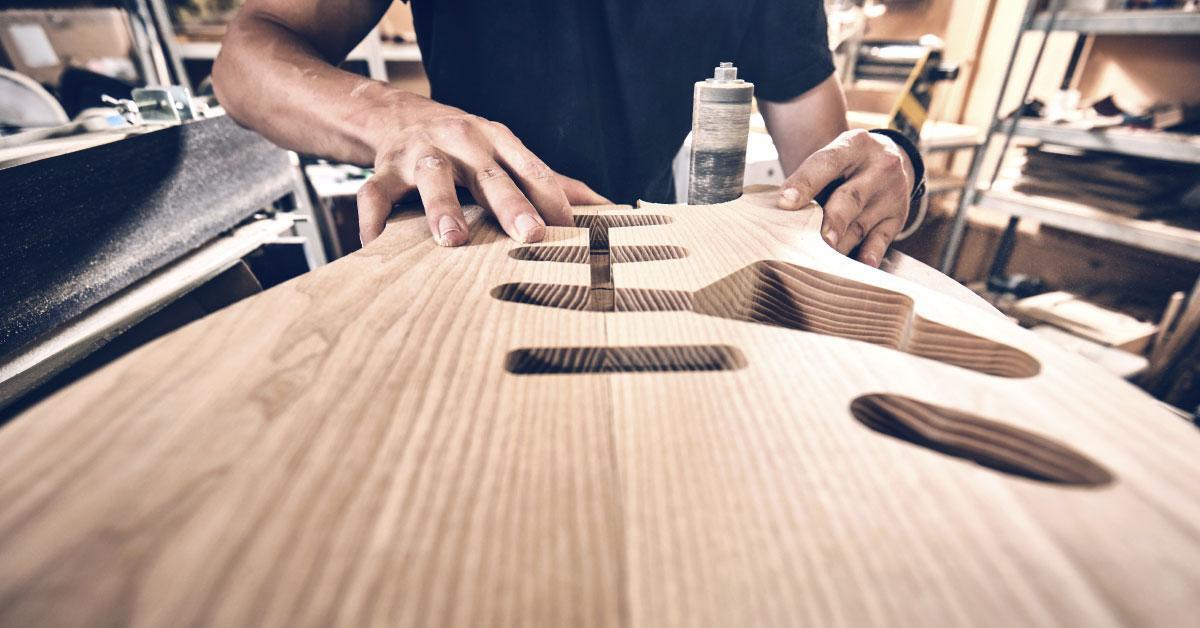
North America has a proud history when it comes to the guitar. Innovations such as Martin's steel-string flat top, the revolutionary solidbody electrics released by Fender, the figured tonewood craze kick-started by Paul Reed Smith, and the alternative construction materials that first arrived on Ovation's cutting-edge acoustics all marked America's ascent to guitar-manufacturing dominance. But times change.
While each of those brands is still going strong, today the vast majority of guitars are manufactured overseas, along the Pacific Rim. This change has created a vast rift between the perceived value of American-made guitars versus their foreign-made counterparts. With the quality of non-American-made guitars at an all-time high, and the prices of US guitars putting a bit of pressure on the average player's wallet, is it time to re-evaluate our biases toward guitars made outside of our borders? Is it time to ask the question, "Does it matter where guitars are made?"
The top dogs of some legendary guitar brands were gracious enough to chat with Sweetwater about this question. Each pulls from vast experience in crafting exquisite instruments, both in the US and abroad, answering a handful of questions to give us a look behind the curtain. They reveal some of their benefits, struggles, and beliefs about whether a "Made in the USA" stamp really has much impact on the quality of an instrument these days.
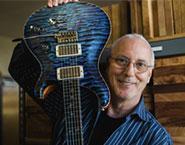
Paul Reed Smith
Founder/Managing General Partner
Paul Reed Smith Guitars
Launching PRS Guitars in the early '80s with a line of fine, handcrafted electric guitars, Paul Smith rose to become one of the most revered guitar makers in the world. His company further cemented its status as an industry leader with their ever-evolving SE line that is made overseas, continuing to prove that high-quality instruments can be crafted around the world.

Andy Powers
Master Guitar Designer
Taylor Guitars
When it was time for Taylor Guitars founder Bob Taylor to find a successor, he turned to Andy Powers. A well-respected luthier in his own right, Andy Powers is Taylor Guitars' Master Guitar Designer and a driving force behind Taylor instrument designs today. His lutherie vision builds on Taylor's rich heritage with new models, new tone and comfort advancements, and more sustainable, more daring tonewood combinations — all while keeping the quality of instruments and demands of musicians first.

Michael Ciravolo
President/CEO
Schecter Guitar Research
In 1996, Michael Ciravolo joined Schecter Guitar Research to revitalize the brand. His Diamond Series instruments revolutionized the industry by offering Asian-made electric guitars with the quality and attention to detail that rival American-made guitars. Today, Schecter continues to be a force in both foreign- and domestic-made, as well as custom shop, instruments.
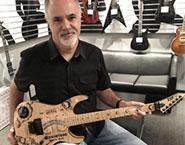
Matt Masciandaro
President/CEO
ESP Guitars
From their earliest days crafting top-tier instruments in Japan, ESP Guitars has proven that you don't have to build your guitars in the US to make a great instrument. Matt Masciandaro is a big part of the company's success, further embracing Asian manufacturing for the company's popular LTD line, as well as founding a California-based US custom shop.
Does the location of an instrument's manufacturing have an inherent effect on its quality?
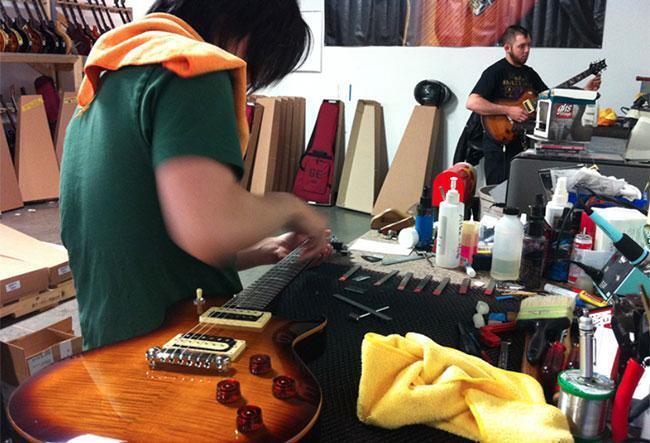
Powers: While theoretically location wouldn't matter, in practice it can and usually does. As an example, when making guitars, it is very important to craft the instrument in a closely controlled range of temperature and humidity, so the guitar won't have warping or cracking problems when it is out in the world in the hands of a musician. Outside extremes tend to lead to a wider tolerance range in a workshop, translating to increased variance in the guitars.
Smith: PRS Guitars is located in Maryland. Maryland has 100-degree, 95% humidity summers and 32-degree, snow-filled but dry-inside (from heaters) winters, which is great for drying wood in an attic over a long period of time, but it's not a conducive environment to make guitars in. Our factory, on the other hand, is engineered and managed to 72 degrees and 50% relative humidity at all times, so we have solved that problem.
Masciandaro: It's a reality that some parts of the world may be more advanced in the art of guitar manufacturing. However, that's changing, and what's important in regard to quality is the experience of the designer and the level of detail in the manufacturing of the instrument, no matter where it's built. Skilled workers and state-of-the-art technology aren't exclusive to the US, and US-made isn't automatically superior.
Ciravolo: There is certainly a realistic and perceived "hierarchy" on the quality of the country of origin in the guitar community. That list would be USA, Japan, South Korea, Indonesia, with China, India, and Vietnam sort of interchangeable.
What elements of the manufacturing process affect the quality of an instrument?
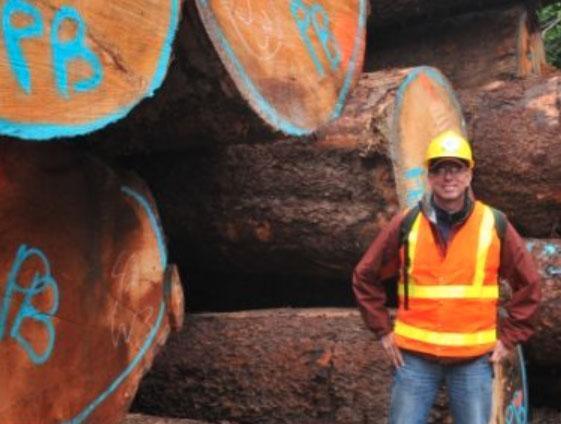
Smith: Oh boy…how much room do I have here? Everything matters. What kind of wood you use, how you cut it, how you store it, how and how much you dry it, what kind of glues you use, if you glue in the frets, how the truss rod is housed, the kind of finish you use, how thick is the finish, having proper lighting, having accurate tools, how you make the pickups, how the electronics' knobs feel in your hand, the quality of the switches, the nut material…I think you get the point.
Powers: Even details as seemingly unimportant as a dust control system in a shop can affect a completed instrument indirectly by influencing the accuracy of woodworking machines, or imperfections in an instrument's finish.
Masciandaro: Perhaps most important is quality control, especially when it's a brand being produced in factories overseas. The US companies who make the extra effort to perform a final inspection of products before being approved to go out to stores and into the hands of musicians are regarded as offering higher quality than those who don't.
Ciravolo: I would say the elements that have the most impact and affect the overall quality of an instrument are manufacturing precision, material quality, and quality control. These do come at a price premium.
What are some of the benefits of US- and overseas-made instruments?

Masciandaro: When we manufacture ESP USA instruments here in Southern California, we can have a direct connection to every step of the manufacturing process , including working directly with retailers like Sweetwater who can provide valuable input on what their customers want. The benefits of overseas instruments, in ESP's case, are we can make guitars and basses at higher volume and with lower price points that better match the budgets of more musicians.
Powers: Here in the United States, we tend to have a very high level of regulation. This results in tightly controlled manufacturing shops where accuracy, cleanliness, and environmental responsibility are at a very high level. This level of continuous scrutiny leads to making very consistent instruments.
Ciravolo: But that [regulation] comes with a cost, especially in California where regulations and the general cost of doing business make it nearly impossible to do an affordable "working man's" guitar. Ninety-five percent of our artists play our Korean-built Diamond Series guitars. These are guitars that most players can afford and walk into any store around the world and get the EXACT guitar or bass that Syn Gates or Nikki Sixx plays.
Smith: For the player, I don't think they have mutually exclusive benefits. In the end, instruments need to feel good, sound good, and look good. That can be achieved anywhere with the right people, the right tools, and the right environment. Obviously, for me, being able to leave my office, walk down a flight of stairs, and be in the factory with the wood and the machines and the people making guitars is a great benefit. Likewise, working with our overseas partners and teaching guitar making has been highly rewarding.
What are some of the challenges of both US and overseas manufacturing?
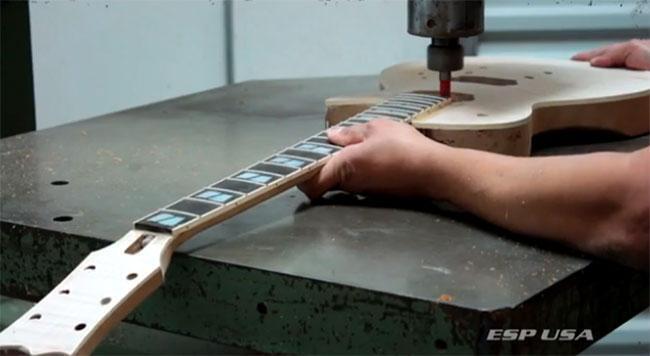
Masciandaro: For a guitar line with the level of quality we expect for ESP USA, the challenge is finding highly experienced people with the very specific expertise in building these guitars to our standards. With overseas manufacturing, we have a great level of trust with each of our manufacturing resources so that no matter where they're built, we can offer great quality and value at the respective price points.
Powers: It can be a real challenge to operate manufacturing facilities in multiple countries, due to differences in governmental regulation, material logistics, service, and a host of other factors including sheer distance. This is why Taylor Guitars has set up our own "overseas" operation in Tecate, Mexico, a neighbor city to San Diego. The close proximity of a 40-minute drive between our two factories allows us to share tools, machines, labor, materials, and an unending list of support that translates into consistent quality up and down our product line.
Ciravolo: The challenge with dealing with an overseas factory is always making sure the quality stays at our level of expectation. Fortunately, we have a long-standing relationship with several factories. This makes it much easier for us to hold them accountable for delivering quality instruments. As far as the benefits and challenges of building guitars here, I simply love walking into our Custom Shop and seeing the process. It is what I imagined a guitar company to be when I was not yet in the business. The challenge is building a high-quality American-made guitar that is in financial reach of players.
Why is there a commonly held belief that overseas instruments are inferior?
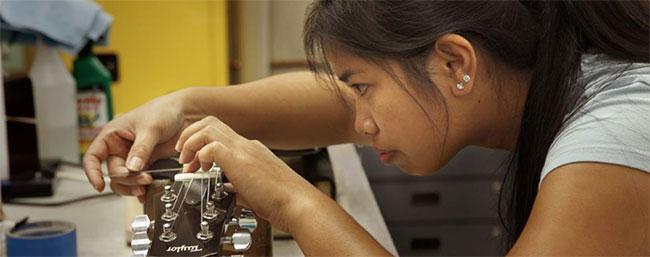
Powers: Frankly, because many instruments built inexpensively in overseas locations have been of poor quality, especially in past generations. Of course not universally, as I've seen wonderful instruments built in locations all over the globe.
Ciravolo: I have certainly seen and played some USA-made guitars that were "dogs" and certainly not worth the price tag. It does come down to the name on the headstock and how much the people there care about what leaves their door.
Smith: I think overseas instruments are seen as inferior by some people because when they first started showing up on the market they were kind of…primitive. Some had necks that were poorly built, making bends and fingerpicking difficult. The stories behind how overseas manufacturing advanced from WWII to today are actually highly interesting, and today, you can get a good overseas-made guitar. We have artists touring with our SEs all over the world, so hopefully the myth of the automatically inferior import is going away.
Masciandaro: I'm not sure this is as commonly held a belief as it once was. Much like the car industry where companies like Toyota and Nissan had to establish trust with American consumers, a number of overseas guitar makers developed excellent reputations for good designs as well as quality and reliability. I don't think that guitars made in Japan, for example, are thought of as inherently inferior in any way by many US-based musicians.
Are there any myths you'd like to dispel about this debate?

Masciandaro: The myths tend to dispel themselves. Guitar players in particular tend to judge each instrument on its own merit, and not discard the idea of a high-quality instrument just because it does or doesn't come from a certain part of the world.
Powers: I haven't heard a guitar speak in Spanish, English, French, Japanese, Korean, or any language from a country where a guitar was made. So I tend to think the guitars don't mind where they are made, so long as they were made carefully and skillfully with the maker keeping the musician's best interests in mind.
Smith: Just because a guitar or an amplifier is made overseas, doesn't mean it is inferior. Likewise, just because a guitar is made in the USA, doesn't mean it is going to be a great guitar. I think a lot of people would agree with the latter part of that, so why not the first?
Ciravolo: I know my answer here is Schecter-specific, but I think it is important to dispel. Many people think that our high-profile artists play USA-built guitars. This is simply NOT the case. The idea of giving the consumer exactly what the artist plays has been one of the key elements to our success.
Do you feel there will always be a demand for locally crafted instruments?
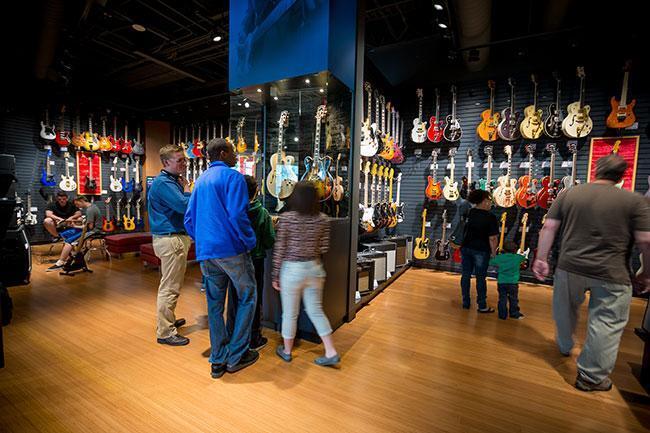
Smith: I do. When something is built with skill, knowledge, and love, it will always find a good home. Magic guitars don't hang on hooks long. We make musical instruments at PRS — tools to do a job — but they are also heirlooms and pieces of art. They can be timeless.
Powers: I believe there will be a demand for the best instruments; the most responsive, easy playing, consistent, musically inspiring instruments whether they are made near a musician's home, or in a location far away.
Masciandaro: There will always be a demand for high-quality instruments that are available within the budgets of the musicians who want them. If those guitars can be made in the country where the player lives, there is an inherently higher level of trust. We're very proud of our ESP USA Series, and we know there are people who are willing to pay a premium for their level of quality, along with the fact that these instruments are made in America. We're proud to have both options available.
Ciravolo: I certainly hope so!
Seems it's time to put the notion that overseas instruments are inferior to bed, while at the same time embracing the value and unique touches that are afforded by instruments made in their home country. As these titans of the industry have pointed out, there are benefits and struggles to crafting a fine guitar, no matter where you do it. Financial concerns, oversight into the manufacturing process, and even government regulation play a huge role in the outcome of each guitar. So whether your main concern is branding, quality of materials, price point, or playability, next time you're in the market for a new axe, go in with an open mind. You may just find your perfect guitar with a different country's name stamped on the back of the headstock. And no matter where it is made, the best place to buy your dream guitar is Sweetwater. Call your Sales Engineer at (800) 222-4700 to get started!
What Electric Guitars Are Made in Usa
Source: https://www.sweetwater.com/insync/matter-guitars-made/
0 Response to "What Electric Guitars Are Made in Usa"
Post a Comment